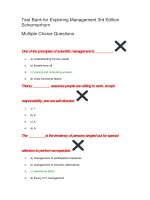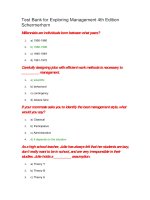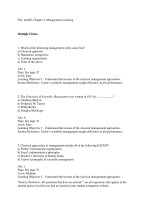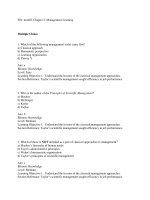Exploring management 6th by schermerhorn ch01
Bạn đang xem bản rút gọn của tài liệu. Xem và tải ngay bản đầy đủ của tài liệu tại đây (463.29 KB, 38 trang )
Exploring Management
John R. Schermerhorn, Jr. and Daniel G. Bachrach
Sixth Edition
Chapter 1
Managers and the Management Process
Everyone Becomes a Manager One Day
Zappos CEO, Tony Hsieh, is into Happiness
He strives “to set up an environment where
the personalities, creativities, and individuality
of all different employees come out and
shine.”
Copyright ©2018 John Wiley & Sons, Inc.
2
Your Chapter 1 Takeaways
•.
What does it mean to be a manager? (1.1)
•.
What do managers do, and what skills do they use? (1.2)
•.
What are timely and important career issues? (1.3)
Copyright ©2018 John Wiley & Sons, Inc.
3
THE MEANING OF MANAGEMENT 1.1
Takeaway 1.1 -- answers to come
•.
Organizations have different types and levels of managers
•.
Accountability is a foundation of managerial performance
•.
Effective managers help others achieve performance and satisfaction
•.
Managers are coaches, coordinators, and supporters
Copyright ©2018 John Wiley & Sons, Inc.
4
THE MEANING OF MANAGEMENT 1.1
Types and Levels of Management
Figure 1.1 What are the Typical Job Titles and Levels of Management in Organizations?
Copyright ©2018 John Wiley & Sons, Inc.
5
THE MEANING OF MANAGEMENT 1.1
Accountability
•.
Accountability
• The requirement of one person to answer to a higher authority for performance achieved in
his or her area of work responsibility.
• In the traditional organizational pyramid, accountability flows upward.
• Accountability in managerial performance is always accompanied by dependency.
Copyright ©2018 John Wiley & Sons, Inc.
6
THE MEANING OF MANAGEMENT 1.1
Effective Management
•
Effective Managers is someone who helps people and organizations perform.
•
Someone who helps others achiever both high performance and satisfaction in their work.
•
Placing importance not just on work performance, but on job satisfaction calls attention to QWL
Issue
•
QWL Issues include the overall quality of human experiences in the workplace.
Copyright ©2018 John Wiley & Sons, Inc.
7
THE MEANING OF MANAGEMENT 1.1
Effective Management
Upside-Down Pyramid
•
The manager as a coach, coordinator and supporter with customers and non-managerial workers are at the top
Figure 1.2 How Do Mind-Sets Change When the Organization is
Viewed as an Upside-Down Pyramid?
Copyright ©2018 John Wiley & Sons, Inc.
8
THE MEANING OF MANAGEMENT 1.1
Study Guide for Takeaway 1.1
Rapid Review:
•.
Managers support and facilitate the work efforts of other people in organizations.
•.
Top managers scan the environment and pursue long-term goals; middle managers coordinate activities among large departments or
divisions; first-line managers, like team leaders, supervise and support non-managerial workers.
•.
Everyone in organizations is accountable to a higher-level manager for his or her performance accomplishments; at the highest level, top
managers are held accountable by boards of directors or boards of trustees.
•.
Effective managers help others achieve both high performance and high levels of job satisfaction.
•.
New directions in managerial work emphasize “coaching” and “supporting,” rather than “directing” and “order giving.”
•.
In the upside-down pyramid view of organizations, the role of managers is to support non-managerial workers who serve the needs of
customers at the top.
Copyright ©2018 John Wiley & Sons, Inc.
9
THE MEANING OF MANAGEMENT 1.1
Study Guide for Takeaway 1.1
Questions for Discussion:
1.
Other than at work, in what situations do you expect to be a manager during your lifetime?
2.
Why should a manager be concerned about the quality of work life in an organization?
3.
In what ways does the upside-down pyramid view of organizations offer advantages over the
traditional view of the top-down pyramid?
Copyright ©2018 John Wiley & Sons, Inc.
10
THE MEANING OF MANAGEMENT 1.1
Be Sure You Can... For Takeaway 1.1
•.
explain how managers contribute to organizations
•.
describe the activities of managers at different levels
•.
explain how accountability operates in organizations
•.
describe an effective manager
•.
list several ways the work of managers is changing from the past
•.
explain the role of managers in the upside-down pyramid
Copyright ©2018 John Wiley & Sons, Inc.
11
WHAT MANAGERS DO 1.2
Takeaway 1.2 -- answers to Come
•.
Managers plan, organize, lead, and control.
•.
Managers perform informational, interpersonal, and decisional roles.
•.
Managers use networking and social capital to pursue action agendas.
•.
Managers use technical, human, and conceptual skills.
•.
Managers should learn from experience.
Copyright ©2018 John Wiley & Sons, Inc.
12
WHAT MANAGERS DO 1.2
The Management Process
• Planning
•
The process of setting performance objectives and determining what actions should be taken to achieve
them.
•
Organizing
•
The process of assigning tasks, allocating resources and coordinating the activities of individuals and
groups.
•
Leading
•
The process of arousing people’s enthusiasm to work hard and inspiring their efforts to fulfill plans and
accomplish objectives.
•
Controlling
•
The process of measuring work performance, comparing results to objectives and taking corrective action.
Copyright ©2018 John Wiley & Sons, Inc.
13
WHAT MANAGERS DO 1.2
The Management Process
Figure 1.3 What Four Functions Make Up the Management Process?
Copyright ©2018 John Wiley & Sons, Inc.
14
WHAT MANAGERS DO 1.2
Management Roles
Copyright ©2018 John Wiley & Sons, Inc.
15
WHAT MANAGERS DO 1.2
Busy Managers
• Managers use networking and social capital to pursue action agendas
Agenda Setting
•
Through agenda setting, managers identify clear action plan priorities
Networking
•
Through networking, managers build and maintain positive relationships with other people, ideally
those whose help might be useful someday.
Social Capital
•
Through social capital, managers build the capacity to attract support and help from others in order
to get things done.
Copyright ©2018 John Wiley & Sons, Inc.
16
WHAT MANAGERS DO 1.2
Management Skills
•
Technical Skills
•
•
•
The ability to use a special proficiency or expertise to perform particular tasks.
Human Skills
•
The ability to work with others.
•
A high level of emotional intelligence
Conceptual Skills
•
The ability to think critically and analytically.
Copyright ©2018 John Wiley & Sons, Inc.
17
WHAT MANAGERS DO 1.2
Essential Managerial Skills Across Levels
Figure 1.4 What Are Three Essential Managerial Skills,
and How Does their Importance Vary Across Levels?
Copyright ©2018 John Wiley & Sons, Inc.
18
WHAT MANAGERS DO 1.2
Management Skills
Emotional Intelligence is the ability to manage ourselves and our relationships effectively.
Five Foundations of Emotional Intelligence
1.
Self-Awareness – understanding moods and emotions
2. Self-Regulation – thinking before acting, controlling disruptive
impulses
3. Motivation – working hard and persevering
4. Empathy – understanding the emotions of others
5. Social Skills –gaining rapport and building good relationships
Copyright ©2018 John Wiley & Sons, Inc.
19
WHAT MANAGERS DO 1.2
Management Skills
Six “Must Have” Managerial Skills
Teamwork: Able to work effectively as team member and leader; strong on team contributions, leadership, conflict management, negotiation, and consensus
building
Self-Management: Able to evaluate self, modify behavior, and meet obligations; strong on ethical reasoning, personal flexibility, tolerance for ambiguity, and
performance responsibility
Leadership: Able to influence and support others to perform complex and ambiguous tasks; strong on diversity awareness, project management, and strategic
action
Critical Thinking: Able to gather and analyze information for problem solving; strong on information analysis and interpretation, creativity and innovation,
judgment, and decision making
Professionalism: Able to sustain a positive impression and instill confidence in others; strong on personal presence, initiative, and career management
Communication: Able to express self well in communication with others; strong on writing, oral presentation, giving and receiving feedback, and technology
utilization
Copyright ©2018 John Wiley & Sons, Inc.
20
WHAT MANAGERS DO 1.2
Study Guide for Takeaway 1.2
Rapid Review:
•.
The daily work of managers is often intense and stressful, involving long hours and continuous performance pressures.
•.
In the management process, planning sets the direction, organizing assembles the human and material resources, leading
provides the enthusiasm and direction, and controlling ensures results.
•.
Managers perform interpersonal, informational, and decision-making roles while pursuing high-priority agendas and engaging in
successful networking.
•.
Managers rely on a combination of technical skills (ability to use special expertise), human skills (ability to work well with others),
and conceptual skills (ability to analyze and solve complex problems).
•.
Everyday experience is an important source of continuous lifelong learning for managers.
Copyright ©2018 John Wiley & Sons, Inc.
21
WHAT MANAGERS DO 1.2
Study Guide for Takeaway 1.2
Questions for Discussion:
1.
Is Mintzberg’s view of the intense and demanding nature of managerial work realistic and, if
so, why would you want to do it?
2.
If Katz’s model of how different levels of management use essential skills is accurate, what
are its career implications for you?
3.
Why is emotional intelligence an important component of one’s human skills?
Copyright ©2018 John Wiley & Sons, Inc.
22
WHAT MANAGERS DO 1.2
Be Sure You Can... for Takeaway 1.2
•.
•.
•.
•.
•.
•.
•.
describe the intensity and pace of a typical workday for a manager
give examples of each of the four management functions
list the three managerial roles identified by Mintzberg
explain how managers use agendas and networks in their work
give examples of a manager’s technical, human, and conceptual skills
explain how these skills vary in importance across management levels
explain the importance of experience as a source of managerial learning
Copyright ©2018 John Wiley & Sons, Inc.
23
IMPORTANT CAREER ISSUES 1.3
Takeaway 1.3 – answers to come
•.
Globalization and job migration are changing the world of work
•.
Failures of ethics and corporate governance are troublesome
•.
Diversity and discrimination are top social priorities
•.
Talent is a “must-have” in a free-agent and on-demand economy
•.
Self-management skills are essential for career success
Copyright ©2018 John Wiley & Sons, Inc.
24
IMPORTANT CAREER ISSUES 1.3
•
Globalization
Globalization
•
The worldwide independence of resource flows,
product markets and business competition.
•
Global sourcing
•
•
Job Migration
•
•
Involves contracting for work to be performed in other countries.
The shifting of jobs from one country to another.
Reshoring
•
Moves jobs back from foreign to domestic locations.
Copyright ©2018 John Wiley & Sons, Inc.
25









